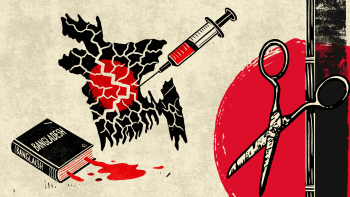How do we avoid a debt trap?

Bangladesh's external debt has doubled since 2017, standing at approximately $100 billion in 2024. This accelerated growth indicates a significant turn in the country's economic direction. Most of this borrowing has gone towards financing large-scale infrastructure projects, supported by bilateral and multilateral sources. However, the pace and magnitude of this debt increase are a cause for concern regarding long-term financial stability. There is apprehension about the country's ability to repay and service this debt, especially in the face of threats from the prevailing global economic environment, rising interest rates, dwindling concessional loans, and stressed domestic economic and political situations.
The country's development spending has also increased, mostly in transport, energy, and connectivity. The investment, however, has not yielded the desired returns due to a chain of inefficiencies. In the meantime, the global situation has worsened, further taxing the country's economy. These external pressures, in addition to internal problems, necessitate Bangladesh's shift towards a more strategic approach to debt management, where borrowed capital is employed effectively and efficiently to promote sustainable growth. Also, emphasis on avoiding mismanagement and corruption will be essential in maximising the economic dividend of foreign borrowings and placing the country's financial situation on a firm footing.
The debt bubble is ominous, given Bangladesh's narrow export base and heavy reliance on remittance inflows. The country's main foreign income source, garment exports, has not kept pace with rising import costs, further adding pressure on the current account deficit. With Bangladesh graduating from its least developed country (LDC) status, concessional finance will no longer be as readily available as before, and debt repayment will become that much harder. Dependence on one export sector also makes the economy perilously vulnerable to risk, particularly during uncertain global trading times. However, attempts at export diversification have so far yielded nothing spectacular, and the economy remains vulnerable to external shocks. The remittance flows, as large as they have been, have also been unstable and unpredictable, which has helped push the financial scene into volatility. Strategic policy measures for dealing with such issues entail reinforcing export diversification, improving investment efficiency, and tapping alternative sources of foreign funding to achieve sustainable economic growth and stability.
The accumulation of debt can badly hinder the government from withstanding economic shocks and confronting crises. With foreign debt amounting to nearly $100 billion now, the necessity for thorough tracking and risk evaluation cannot be overemphasised. The country needs a strategic roadmap to ensure that borrowed resources, when wisely invested, generate sustainable returns. Good debt management requires transparent methods, prudent investment decisions, and continuous scrutiny of debt-servicing capacity. Without these measures, Bangladesh could be led into a debt trap that will limit long-term economic growth and stability.
Grand corruption suspected under the previous administration has been among the reasons for serious concerns over the projects funded through foreign borrowings. Kickbacks, overspending, and mismanagement were reported in some of the costly development projects. Corruption not only squanders borrowed capital but also undermines project quality and economic return. Such misdoings erode debt sustainability even further as they divert resources away from productive employment. Consolidation of control and the introduction of a proper monitoring, evaluation, and learning framework into future initiatives are vital to re-establish trust and gain maximum benefit from foreign lending.
The misplacement of borrowed capital through corrupt means in Bangladesh's development is highly distressing. Abuse of borrowed capital deprives the country of economic growth, which is essential for repaying loans. This forms a vicious circle of debt growth with no economic return, increasing fiscal weakness. Fighting corruption requires a comprehensive framework consisting of robust legal measures, oversight, and a vibrant civil society. These ensure that funds are channelled into projects that genuinely support the economy and the people. To achieve sustainable development and avoid becoming trapped in a debt spiral, Bangladesh must ensure transparency, accountability, and effective utilisation of borrowed funds. This will help build economic resilience, strengthen infrastructure, and eventually lead to long-term stable growth.
Bangladesh's escalating external debt, while primarily channelled into infrastructure, presents a multifaceted challenge to the country's financial outlook. Navigating this complex landscape requires a concerted effort to fortify the economic bedrock, ensuring that foreign capital genuinely underpins resilient growth rather than perpetuating vulnerabilities. A robust framework centred on prudent fiscal stewardship, diversification beyond narrow export sectors, and unwavering commitment to governance will be paramount for Bangladesh to convert its borrowings into sustained prosperity and secure its long-term financial health. Additionally, addressing inefficiencies in development expenditure and enhancing transparency in project management are crucial steps. Effective use of borrowed funds, coupled with strategic policy reforms, is essential for Bangladesh to avoid falling into a debt trap and to achieve stable, sustainable growth.
Dr Selim Raihan is professor in the Department of Economics at the University of Dhaka and executive director at the South Asian Network on Economic Modeling (SANEM). He can be reached at [email protected].
Views expressed in this article are the author's own.
Follow The Daily Star Opinion on Facebook for the latest opinions, commentaries and analyses by experts and professionals. To contribute your article or letter to The Daily Star Opinion, see our guidelines for submission.

 For all latest news, follow The Daily Star's Google News channel.
For all latest news, follow The Daily Star's Google News channel. 







Comments